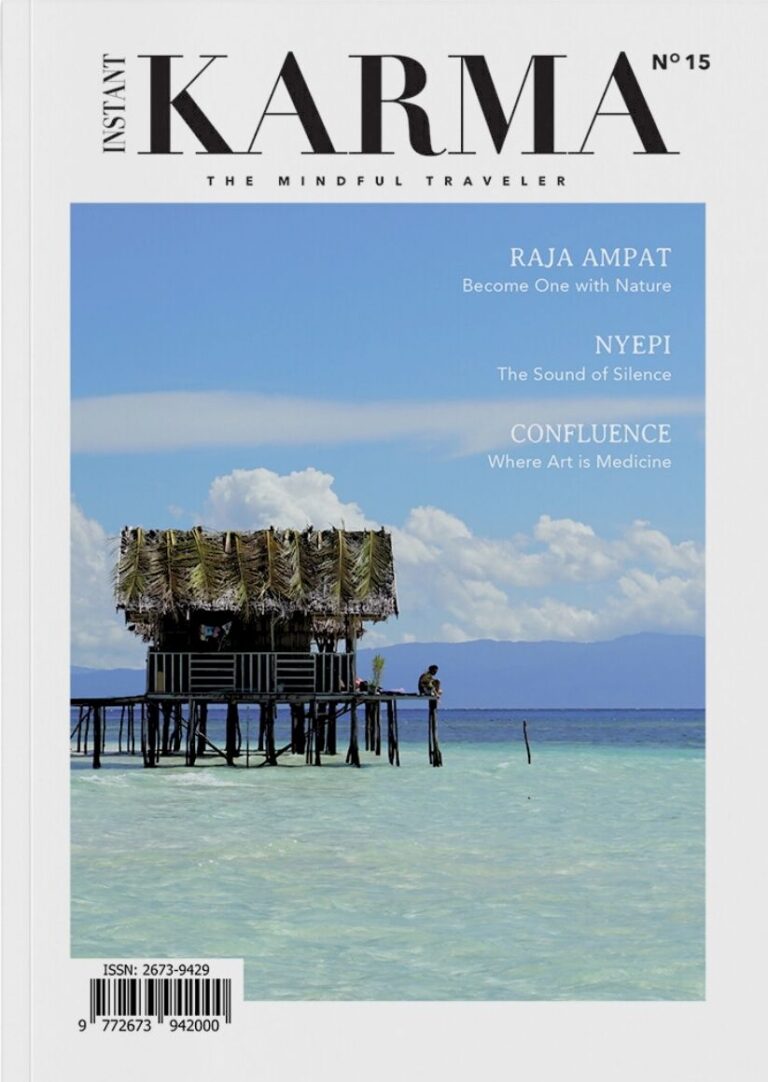During Nyepi, some people book to stay at a hotel (and get their special discount) simply because they can’t stand the throbbing sound of silence. Others decide to stock up on food as if Nyepi will last for a week, and they feast the whole day. For them, it is about diversion.
Well, to each their own. But the quintessential experience of Nyepi can be wonderful – if you give in to the complete silence.
Catur Brata Penyepian
The Balinese Hindu way of celebrating their New Year is the Day of Silence, based on the Indian-origin, moon phases-driven calendar of 12 months that comprises 354-355 days a year. The New Year falls in March (in our Gregorian calendar).
In a nutshell: Nyepi is a day of cleansing. This special time for the Balinese begins from Melasti, two days before, when all ceremonial paraphernalia are cleansed in the ocean and rivers.
This ceremony is followed by Pengrupukan, a day when the demons are out to play – in the form of the impressive and fearsome Ogoh-ogoh effigies (on display in Bali’s streets) that represent bhuta kala and bad spirits.
In another act of symbolism, all the ogoh-ogoh are then brought to the cemetery (setra) to be burned. Thus, cleansing the land of all evils.

Then comes Nyepi.
There are four rules to be adhered to during Nyepi. They are listed as Catur Brata Penyepian, roughly translated as the four meditations of silence. On the one hand, you can take these four sacred rules at face value (like the Ten Commandments); on the other, they have symbolic meanings that encourage followers to perpetuate them in their daily life.
Amati Geni.
No Fire, which in the modern world equates to no TV, no phone, no music, and lights out. This also means no fire to cook, so one is expected to fast during this day. Fire represents anger and desire; thus, this first rule teaches us about controlling our emotions and silencing our often wandering minds.
Amati Karya.
No Work—nothing external, anyway. This is a time to meditate, to venture into our interior. The reading of holy texts (in this case, the Weda) is also encouraged on this day.
Amati Lelanguan.
No seeking Pleasure. Instead, the mind can focus on the Great Maker (Hyang Widhi) and the natural world to remember and not forget our relationship with nature.
Amati Lalungaan.
No travel. We root ourselves in our present moment. And we just be. (Isn’t that why we are called, Human Beings?).
The Hindus believe a person is forever reincarnated (into a lesser being if they were sinful in their previous life).
They believe in karma, which is best explained by the expression, “you reap what you sow.” Only after they lead an exemplary life can they finally reach moksa, the ultimate enlightenment where the body is released from earthly trappings.
Catur Brata Penyepian prepares one to reach that desirable plateau.

In the Company of Silence
Nyepi can be a rejuvenating and mesmerizing experience. To wake up and not hear the sounds of vehicles and only the twittering of birds or the flow of water from the river. It will feel surreal at first, but eventually you ease into it.
Then you realize nature is, in fact, full of sounds and never silent. During this day, modern sounds are absent, and that is refreshing.
The stars should not be the only thing to look forward to, although they are magical that night. Nyepi teaches us to be able to live with silence. Other sounds fade, but silence will never abandon us.
–
While some may seek distractions or indulgences during this time, the true essence lies in embracing the silence and following the four meditations of Catur Brata Penyepian. By adhering to these principles, one can attain a sense of inner peace and prepare oneself for ultimate enlightenment. It is a rejuvenating and mesmerizing experience for those who are willing to give in to the company of silence.
Why do the Balinese celebrate Nyepi?
It’s a Hindu-Balinese tradition that is believed to be a day of self-reflection and purification. It is also believed to ward off evil spirits and purify the island of Bali. The day before, known as the “Day of Saka New Year,” is celebrated with colorful parades and offerings to the gods. It’s a time for the Balinese people to observe complete silence and introspection, reflecting on their past deeds and committing to a new beginning.
How can tourists make the best of Nyepi Day?
While it may seem like an inconvenience to some tourists, it is a unique and culturally significant experience that can be embraced with some preparation. Here are some tips to make the best of Nyepi Day:
Plan ahead: all shops and restaurants will be closed.
Stay indoors: Respect the Balinese culture.Use the time for introspection, reading, or spending quality time with your travel companions.
Try a Balinese spa treatment: Many hotels and spas offer special packages and treatments during Nyepi Day.
Attend Melasti ceremony: If you’re in Bali during the days leading up to Nyepi, consider attending the Melasti ceremony. This is a beautiful and colorful ritual that takes place on the beach and involves the purification of sacred objects.
Learn about Balinese culture: Use the time to learn more about Balinese culture and traditions. Read books or watch documentaries on Balinese Hinduism, or try your hand at making traditional offerings.
Remember to respect the Balinese culture and traditions during Nyepi Day, and use the time as an opportunity to reflect and recharge.
What is Nyepi?
Nyepi is a traditional Balinese “Day of Silence” that falls on the first new moon in the Balinese Saka calendar, usually around March or April. The celebration lasts for 24 hours and is marked by a complete shutdown of all activities in Bali, including electricity and transportation.
What can I expect on Nyepi?
On the day of Nyepi, the island of Bali comes to a complete standstill. The airport and all ports will be closed, and no one will be allowed to leave their homes or hotels. The streets will be empty, and the only sounds you will hear are those of nature. The Balinese people will observe complete silence, with no lights or fires being lit, and all curtains and blinds will be drawn to keep the darkness inside.
Can I still stay in a hotel during Nyepi?
Yes, hotels are still open during Nyepi, but guests are not allowed to leave their rooms or use any lights or electronic devices. The hotel staff will also be observing complete silence and minimal activity.
Is it safe to travel to Bali during Nyepi?
Be aware that all transportation, including flights and ferries, will be suspended on the day of Nyepi. It is also recommended to plan your travel and accommodation well in advance, as many hotels and villas may be fully booked during this time.
What happens after Nyepi?
The day after Nyepi is known as Ngembak Geni, and it is a time for socializing and forgiveness. The Balinese people will visit their friends and family, and ask for forgiveness for any wrongdoings. They will also perform the Melasti ceremony, in which they purify their sacred objects and take them to the sea to symbolize the cleansing of their souls.
What happens on the day before Nyepi?
The day before Nyepi is a colorful celebration called “Day of Saka New Year” or “Nyepi Eve”. It features parades, offerings to the gods, and the “ogoh-ogoh” parade, where giant paper mache figures are burned to purify evil spirits. It’s an unforgettable experience for tourists in Bali.




